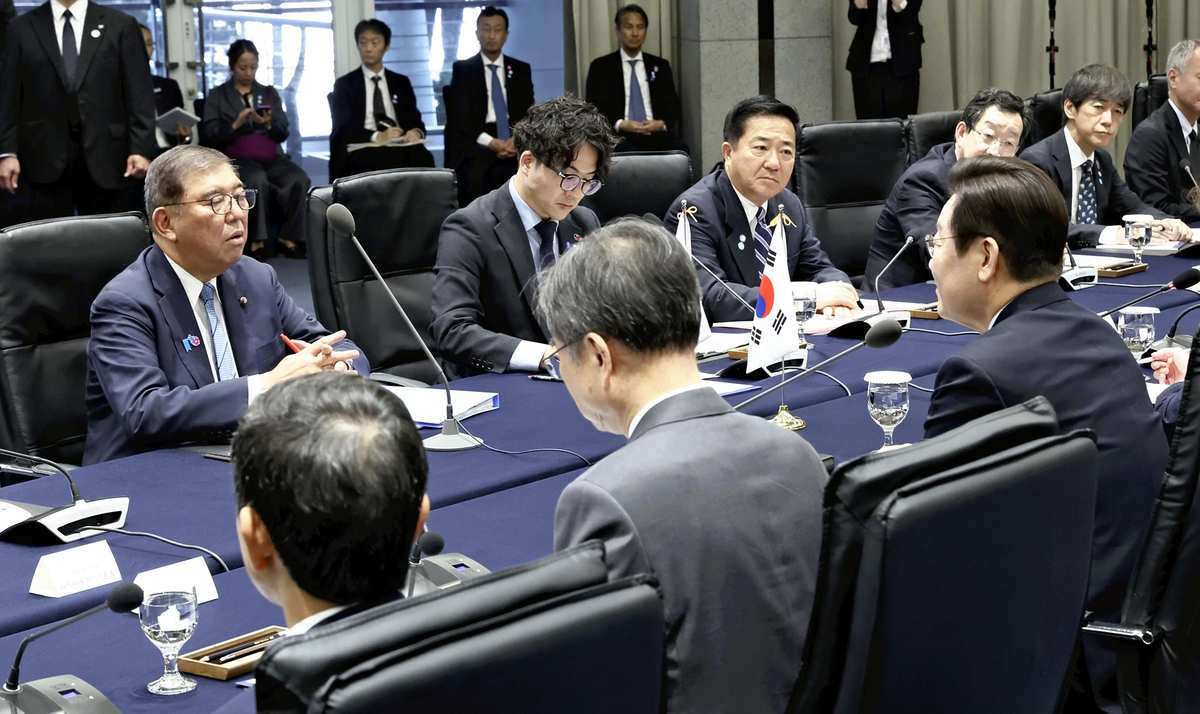
The Yomiuri Shimbun
Prime Minister Shigeru Ishiba, left, and South Korean President Lee Jae Myung, who is sitting in front of him, meet in Busan, South Korea, on Tuesday.
20:00 JST, October 1, 2025
BUSAN, South Korea /SEOUL — Prime Minister Shigeru Ishiba’s final overseas trip to South Korea was intended to pave the way for his successor to inherit stable bilateral relations.
The last-minute visit, which followed South Korean President Lee Jae Myung’s inaugural trip to Japan in August, successfully placed the leaders’ reciprocal visits on a reliable track.
“Busan is a place where one can see Tsushima on a clear day, demonstrating the proximity of the two countries. I hope we can make efforts to have frequent exchanges,” Ishiba said at the start of a meeting held on the southern tip of the Korean Peninsula.
In response, Lee, who proposed holding the meeting in Busan, said, “This is the essence of reciprocal visits that only South Korea and Japan can achieve.”
Reciprocal visits between the leaders of the two countries had been suspended since the impeachment of former South Korean President Yoon Suk Yeol. With Ishiba and Lee visiting each other’s country, leaders’ reciprocal visits have fully resumed.
Despite a schedule lasting less than 24 hours, they fostered an atmosphere of friendship through a dinner and the announcement of an outcome document.
The stable bilateral trend has persisted, even following the shift from the conservative Yoon administration, which advanced improved Japan-South Korea relations, to the left-leaning Lee administration.
This stability is largely attributed to “the good chemistry between President Lee, who advocates for realistic, practical diplomacy, and Prime Minister Ishiba, who puts emphasis on South Korea,” according to a Foreign Ministry senior official.
Ishiba’s statement during a 2017 interview with South Korean media that Japan needed to thoroughly reflect on its defeat in World War II is well-known in South Korea. This has led many to view him as being friendly toward South Korea.
After the meeting, Ishiba told reporters, “We must have the courage to face history squarely.” This statement echoed Lee’s earlier appeal to continue future-oriented cooperation while facing the past.
Given that diplomacy with South Korea has often been influenced by the personal chemistry between leaders, the resumption of reciprocal visits is highly significant. However, it remains uncertain whether it will continue smoothly.
Amid the strained U.S.-South Korea relationship over tariff issues, Lee, who wants to stabilize Japan-South Korea ties, expressed concern at a Sept. 11 press conference that the change in prime ministers in Japan could complicate bilateral relations.
With dissatisfaction simmering among Lee’s supporters toward the South Korean government for maintaining its stance on lawsuits concerning former wartime requisitioned workers from the Korean Peninsula, there is apprehension that if the new prime minister visits Yasukuni Shrine or takes similar actions, this discontent could erupt in South Korea.
The exceptional welcome Ishiba received is also seen as “a message urging the next administration to inherit the progressed South Korea-Japan relationship,” according to the South Korean newspaper, Hankyoreh.


AloJapan.com